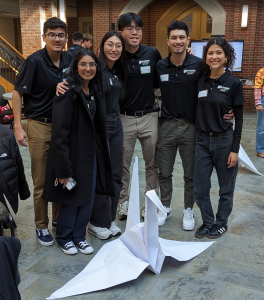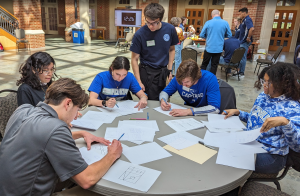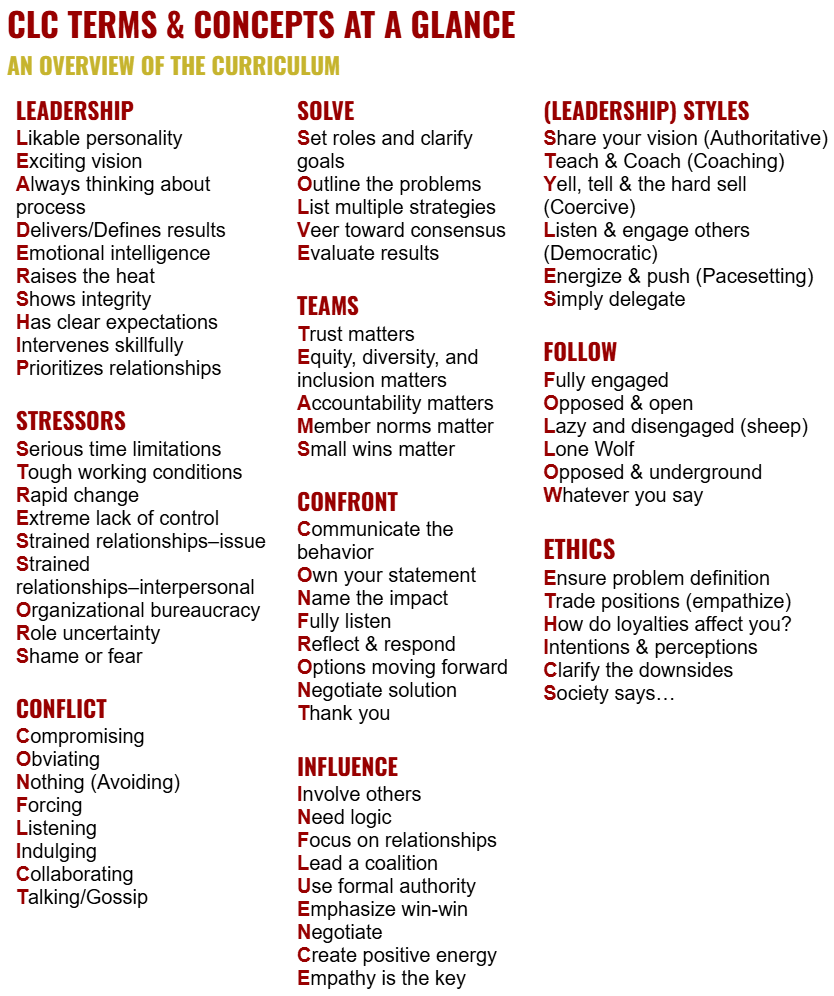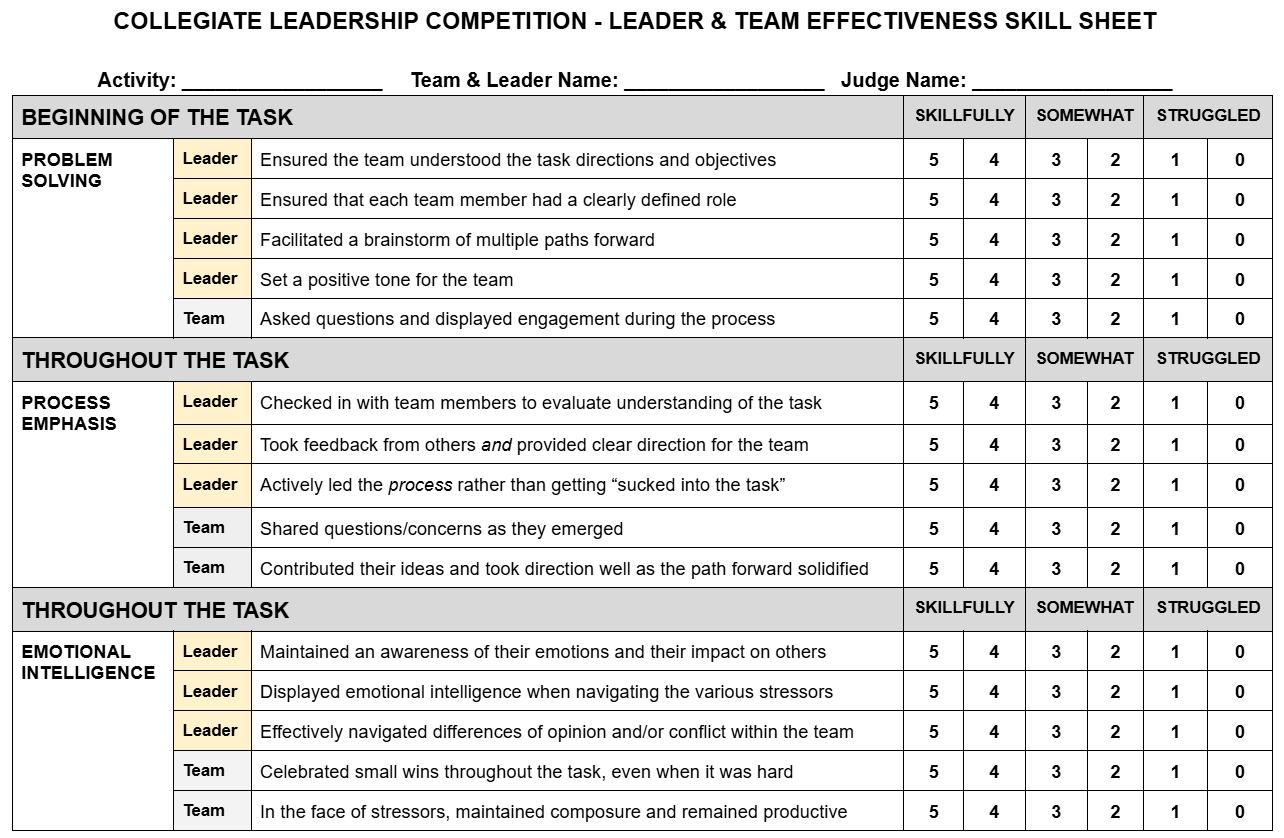Who We Are
We are educators who believe in the value of competition as a high-impact learning experience. Founded in 2015 as a non-profit higher education leadership program, the Collegiate Leadership Competition (CLC) joined the Management and Organizational Behavior Teaching Society (MOBTS) in 2024.
What We Do
No amount of sitting in a room talking about leadership will create better leaders; that’s why CLC creates a dynamic practice field where students can apply what they are learning through creative, hands-on, and never-before seen activities that stretch teams to the boundaries of their knowledge, skills, and abilities. Our goal is to create a tangible experience for learners, recognizing that learning how to lead and follow is ongoing and takes time, dedication, practice and a team who is willing to give and receive feedback.

How We Do It
1. CLC has developed an integrated and practically useful curriculum that summarizes seminal work on leadership, followership, teamwork, and more, in less than 40 pages
- All content is organized across ten easy-to-remember acronyms, an intentional choice to facilitate knowledge retention and application. We also update the curriculum annually.
- Reflection questions, links to videos, and additional materials enhance the learning.
2. CLC recruits teams across North America to learn and practice the curriculum from January to March. More than 250 teams from 100+ institutions have competed to date!
- Coaches host weekly practice sessions (~2 to 3 hours) with students, focusing on developing their collaboration and feedback skills as they solve problems, together.
- A library of practice activities, best practice guides, coaches roundtables, and one-on-one support help guide coaches through the experience.
3. CLC hosts in-person and online competitions to culminate the practice season!
- Teams of four to six compete in six unique challenges, earning points for their problem-solving process and the results they can achieve.
- Built-in reflection periods offer teams time to strategize between activities.
- Refreshments, supplies, and prizes are provided!
- Teams can compete in-person (Regionals), online (Global), or both!
- Regionals: various Saturdays in March on campuses across North America.
- Global: Thursday evening and Saturday midday in April, on Zoom.
How You Do It
 1. Formulate Your Team!
1. Formulate Your Team!
- Whether through a leadership course, an extracurricular activity/lab, or a management/leadership-oriented club, as a Coach you'll want to pull together (per team) 4-6 students who are willing and able to engage in leadership content 2-3 hours per week.
2. CLC provides you access to an extensive activity library
- With a library of ~100 activities - and growing! - your students will have their comprehension and application of leadership skills, traits, and approaches tested over the course of their preparation.
- Library activities are available in both short and long formats, both in-person and virtual, as your students will face leadership issues across a variety of workplace environments during their careers.
3. CLC provides you with a curriculum structure
- With MOBTS being a leader in experiential learning for over 50 years, and the CLC in experiential leadership for nearly a decade, you will have a recommended curriculum provided to you that you can adapt to your own needs and engagement. We take you through the leadership topics we focus on from A through Z providing you the framework necessary for an impactful learning experience and takeaway for your students.
4. Sample Practice Agenda
- We provide you with sample practice agendas so you can put your team to the test before the competition begins! We have ten practice agendas that you can plug-and-play into your curriculum/schedule.
5. Coaches Roundtable
- Join us for multiple Coaches Roundtables leading up to the competition so that we can provide you with insights and expectations, and you can ask us any questions you may have, provide feedback, and share the learning experiences your students are having throughout the program!
6. One-to-One Support

- Need assistance along the way? Is your team falling into a rut? Are they struggling with internal conflict, leadership styles, or motivation? Reach out to us at any point and we'll be happy to schedule a one-to-one time with you to see how we can assist, share experiences of past teams and how they handled such situations, and so forth. Growth in leadership is an experiential process and we're here to assist with that!
Sneak Peak at the CLC Competencies
CLC Terms & Concepts
The CLC Terms & Concepts are at the core of the learning outcomes for your students. The CLC Terms & Concepts distill leadership theory into bite-size, action-oriented prompts students can remember under pressure and apply in real time. By organizing core ideas around everyday verbs (e.g., Set, Outline, Listen, Evaluate) and common situations (stressors, conflict, ethics), the framework creates a shared language across teams and judges. This enables rapid coaching, consistent feedback, and intentional transfer from practice to performance, thus turning abstract leadership principles into concrete behaviors that drive measurable student learning outcomes. Click here to view the Google Doc of the terms.

Leader & Team Effectiveness Skill Sheet
During each event, students are assessed against the CLC Leader & Team Effectiveness Skill Sheet, often referred to as the L&TESS. This skill sheet provides a clear rubric that specifies the behaviors expected at the beginning of a task and throughout execution. Judges rate both leader and team actions (problem solving, process emphasis, and emotional intelligence) on a 0–5 scale, rewarding evidence of role clarity, constructive feedback, composure under stress, and collaborative momentum. Students are expected to demonstrate these behaviors consistently; scores and comments guide immediate debriefs and targeted improvement from one activity to the next. Click here to view a Google Doc of the full L&Tess.

Opportunities to Get Involved
Coach a Team
We are looking for coaches who have approximately two hours a week between January and March to coach students and create a culture of feedback.
Coaches may integrate CLC into existing courses or offer an extra-curricular experience to dedicated students. We have had winners from both streams!
Host a Competition
We are looking for regional hosts across North America who can host:
- on a Saturday (typically March);
- in a space that accommodates 6-12 roundtables of eight;
- refreshments (breaks, lunch), whether catered or through on-campus dining hall facilities.
MOBTS will cover all food and beverage expenses, activity supply costs, etc.
We encourage hosts to provide session spaces for a single Saturday at no cost to the organization.
...And More!
There are many ways to join the CLC community!
- Be a judge
- Join a committee
- Activity development and testing
- Research
Did You Know?
As a learning tool, competition has been demonstrated to…
- be a spur for personal growth (Sampson, 1988);
- have a positive effect on individuals’ self-esteem (Ryckman et al., 1996); learning and motivation (Ambrose et al., 2010; Cagiltay et al., 2015); and academic performance (Van Nuland et al., 2015);
- decrease distractions and increase engagement with learning (Admiraal et al., 2011);
- encourage cooperation and knowledge sharing with team members (Liu et al., 2022);
- encourage learners to de-emphasize knowledge acquisition and instead emphasize learning how to learn, improving the transferability and longevity of their acquired skills (Argyris, 1980, 1991; Armstrong & Fukami, 2010);
- lead to other benefits such as memorable experiences, peer bonding, and social capital development (Gamble & Jelley, 2014).
The Collegiate Leadership Competition has been demonstrated to…
- have a positive effect on leadership skills, self-efficacy, and motivation (Rosch & Headrick, 2022; Rosch et al., 2022);
- maintain self-efficacy increases four months after the competition (Rosch et al., 2022);
- benefit participants across gender (e.g., male, female) and class years (e.g., first, second, third, fourth) (Rosch et al., 2022; Rosch et al., 2024).
Harness the motivational potential of competition to create a space where learners challenge themselves and commit to developing together.